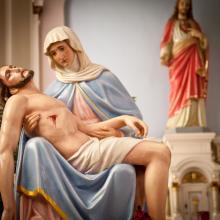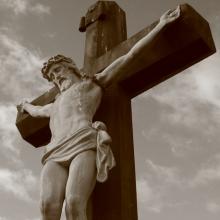Good Friday

Image via Mansoreh/Shutterstock.com
Poor people just don’t know what’s good for them. Freedom, after all, is only possible after order is established. If they can’t do for themselves what needs to be done, we’ll do what needs to be done anyway. Protect them from themselves.
As for the radical, his calls for “change” and a better way of life will fade after people are sufficiently fed, safe, and entertained. After all, who has the appetite for revolution when their bellies are already full?
They’ll thank us later.

Image via Valentina Calà/Flickr
In the space between Palm Sunday and Good Friday, between the acclaiming of Jesus as a king and his execution as a threat to the political order, I was no more ready to read the news this morning. The stifling, exhausting repetition of violence and terrorism is both all too common but still shocking. And yet, I hope that Christians in particular can draw upon the narrative arc that moves us from Jesus’ triumphal entry to his seeming defeat on Calvary.
I drove by a church last week, a few days before Palm Sunday, and read their sign: CHRIST HAS RISEN!
Um, no. No he hasn’t. In the Christian calendar he hasn’t even died yet. But this is an all-too-common phenomenon in Christian Churches.
Why?
“Come to the living God … Come to stand alongside those who suffer
Come to those who seek freedom … Come to resist all that offends God’s justice
Come to Jesus as He hangs on the Cross … Come to the living disturbing God.”
DURBAN, South Africa — A precursor to Easter sunrise and call to commitment is the now 30-year ritual Good Friday packing of the International Exhibition Center with 3,000+ ecumenical congregants participating (with dance, choir, prayers, and prophetic preaching) in the call to “Arise – Act for a Just Society.” Anglican Bishop Rubin Phillip set the scene with a moving historical reminder of the reason for the 1985 first march to the central prison. It was to protest the silencing of the 16 Durban “treason trialists” (including congregational deacon Archie Gumede, and Frank Chikane, post-apartheid member of the first multiracial Assembly, Apostolic pastor, and future President Nelson Mandela staff chief). Family members of the incarcerated and current elected leaders carried a cross to city hall, calling all to love mercy and act justly. We paused to give thanks for their courage at the one remaining wall of the prison now in the front plaza of the iconic convention center. When the first march 30 years ago stopped to sing and pray, “voices were heard from inside the prison joining in the singing of Good Friday hymns.”

Photo via R. Gino Santa Maria / Shutterstock.com
We call it Holy Week. But it was a terrible week.
His trial reeked of injustice. His own disciple sold him out for a few pieces of silver, betrayed him with a kiss … and hung himself.
As he was arrested, one of his closest friends disregarded all his teaching on love, pulled out a knife, and cut a guy’s ear off. (Jesus called him out … and healed the other guy). A lot of the stuff that happened that first holy week was pretty unholy.
Once arrested, he was passed back and forth between politicians and bureaucrats. There was Caiaphas the priest, the Sanhedrin council, Pontius Pilate, the crowd — everyone seemed to want him dead, but no one wanted blood on their hands. Even Pilate washed his clean.
They had all kinds of accusations. Insurrection. Inciting a riot. Conspiracy. Terrorism (plotting to destroy the temple). Blasphemy.
But all he did was love. And heal. And give people hope.
Despite any substantial evidence, witnesses, or signs of any crime committed, he was pronounced guilty and sentenced to die.
As he awaited his fate, he was bullied, interrogated, harassed, tortured, beaten to a pulp. The authorities humiliated him and stripped him naked. They mocked the claims of his divinity, ramming a crown of thorns onto his head and wrapping him in a royal purple robe as they laughed.
And so it went. This man who many believe was the holy one that the prophets spoke of, the long-awaited Messiah, God incarnate, love with skin on— was executed, brutally. He died with his body convulsing as his lungs collapsed, with vultures swarming overhead, hoping to clean up after the execution. There is nothing more evil than what happened that “Good” Friday.
This is Holy Week, the most sacred time of year for Christians. It is the time they mark the betrayal, trial, and crucifixion of Jesus, and a week that culminates in Easter Sunday, the day Christians believe Jesus rose from the dead. So what do colored eggs have to do with anything? Let us Egg-‘Splain …
Q: Is Holy Week really a whole week? I only know about Good Friday and Easter Sunday.
A: Holy Week is the entire week between Palm Sunday and Easter Sunday. Not a whole lot happens on Monday and Tuesday, but some Christians mark the crucifixion on Wednesday, and some celebrate Maundy Thursday, the day of the Last Supper, Jesus’ final Passover meal with his disciples. It is sometimes celebrated with a foot-washing ceremony, a tradition beloved by Pope Francis, and a “Pascha” or “Paschal” meal, derived from the Jewish Passover Jesus would have known. Then comes Good Friday, Holy Saturday, and Easter Sunday. Fun fact: Not all American Christians greet each other with “Happy Easter.” To many evangelicals, the day is “Resurrection Sunday,” in part because they believe the word “Easter” has pagan roots.
Q: What is so “good” about Good Friday, the day Jesus was horribly tortured to death?
This year, Good Friday and the start of Passover occur on the same date: Friday, April 3. The coincidence is no accident.
Jesus’ pilgrimage to Jerusalem to celebrate the eight-day Jewish festival marking the Hebrew slaves’ exodus from Egyptian slavery was a religious requirement for Jews of his day. After his death by Roman crucifixion, Passover became an integral part of the Easter story, and Jesus’ Last Supper was like an early version of what later became the Passover seder meal.
In past years, I anonymously attended Good Friday services in New York and sat alongside Christians as they commemorated the death of Jesus as recounted in the New Testament Gospel of John. I alternated each year between Roman Catholic and Protestant churches because I was interested in how preachers handled John’s 71 references to the Jewish people, a text that’s often called “radioactive” because of its negative teaching about Jews and their alleged culpability in killing Jesus.
I attend the most solemn Christian service of the year knowing it had often been a day of dread and even death for many European Jewish communities.
My friend sent this link to me the other day, as it’s something we’re considering doing ourselves. The idea is simple, though would take some effort and a little courage to do well.
You get artists, singers, musicians willing to go out into the streets and share their music with anyone they meet, in a spirit of engagement, community, and purveyors of joyfully selfless and unexpected moments.
You go where the people are (sound familiar?).
You have a purpose (not to recruit people into your church; that’s selfish and not something I remember Jesus focusing on as much as being a healer and servant).
You give everyone you encounter an opportunity both to participate and to engage the cause.
This (below) is a pop-up church in a train station in the U.K. Personally I could have done without the giant crosses in the middle — but if nothing else, it helped share attention with the people involved, which should be part of the point. They’re inviting people into a sort of flash-mob singalong of “Lean on Me,” a spot-on choice for Good Friday in my universe. Then people are given a chance to drop a few coins, some food, or whatever they have to give into a donation space for a local book bank.
I used to hate Good Friday. Jesus dying a gruesome and unjust death didn’t seem particularly “good” to me. Even now, when I watch a Jesus movie like The Greatest Story Ever Told (or let’s be real: Jesus Christ Superstar), I find myself secretly hoping that someone in the crowd will say “wait a second! Just four days ago we really liked this guy. Crucifixion is a terrible idea, let’s go have Passover.” Mic drop.
The idealist and optimist in me would prefer to be reminded that the cross was empty, that Jesus was alive, to focus less on Good Friday and more on Easter Sunday. But I have come to appreciate the image of Christ on the cross much more now that I’m an adult and there are things that I have said and done in my life that deserve a reckoning. Jesus is there, gladly bearing my sin on the cross.
I’ve come to appreciate that there are so many broken and twisted places in this world that need a Redeemer. And Jesus is there, undoing the power of sin and evil on the cross.
Don’t you hate it when you accidentally slice the tip of your finger on one of your knives and the cut is deep enough to draw blood? Or when one of the cats gets a little too playful with the claws and you’re soon looking for a bandage?
Nobody likes to bleed, even though bleeding is part of life. To live is to bleed. If we’re not bleeding, we’re not living.
We all bleed lots of times, in lots of ways. We skin our knees and scrape our emotions. We often have to head for the medicine cabinet for a bandage. Sometimes, we feel like we need a tourniquet.
There are the little, daily cuts that we all get. Someone says something that hurts our feelings. Something doesn’t turn out the way that we’d hoped, and we get discouraged. A project that we’ve invested so much of ourselves into gets rejected, and we feel rejected, too.
It happens all the time.
Sometimes, we wind up with a deep spiritual cut that needs to be stitched closed with the help of others. A relationship ends. A job disappears. A tumor appears. A storm blows through our neighborhood and destroys what we’ve built over the years.
I admire those who learn not only to accept the blood-stained moments, but to embrace them. They develop a capacity to see beyond the momentary hurt. They recognize that bleeding is part of the grand process of life.
And they bleed joyfully.
Friedrich Nietzsche is a favorite whipping boy among Christians. It’s difficult to blame my fellow Christians for this. After all, Nietzsche is known for many provocative anti-Christian statements, but his most provocative statement might be that “God is dead.”
And yet, in his latest book A God Torn to Pieces: The Nietzsche Case , philosopher Guiseppe Fornari makes a claim that is just as provocative: “In the end [Nietzsche] was much closer to Christ than many who would claim to be Christians.”
Wait …Nietzsche was closer to Christ than many Christians? How could that be?
Nietzsche understood the implications of what Christ did on Good Friday better than many who claim to be Christians. Nietzsche was closer to Christ than many Christians because he knew the Christ that he rejected, whereas many Christians don’t know the Christ whom they call Lord and Savior.
Who was the Christ that Nietzsche rejected and that many Christians do not know? It’s the Christ who says from the cross, “Father, forgive them, for they know not what they do.”
We love a good parade, don’t we? All that celebration, the noise, the crowds, the jubilation … It’s exciting and contagious and a little amazing how a good parade can impact us.
No one understood this like the Romans. These are the people of bread and circuses after all, and no one in the ancient world did empire better than the Romans. The Romans were incredibly good at subduing those people they had conquered. They celebrated the festivals of, raised up leadership from, and generally ingratiated themselves smoothly into the lives of those they ruled. But rule they did.
There certainly were people in Jesus’ time who thought Jesus’ work would be to overthrow the Roman oppressors — establish a political kingdom. Scholars surmise that Judas, the disciple who would betray Jesus to the empire, was one of these. Think of Judas as someone who saw the evils of the Roman Empire and desperately wanted Hebrew rule returned to the region. What we might today call a freedom fighter.
But throughout his ministry, Jesus talked explicitly about the Kingdom of God, the Kingdom of Heaven that is not of this world but is omnipresent, always at hand, constantly among us. And God’s. Period. A very different image of kingship, of dominion.
As Christians around the world gathered for Good Friday and Resurrection Sunday celebrations last weekend, I have reflected a great deal about the connection between the suffering and passion of Christ and the plight of the undocumented in our nation.
This past year, an amazing surge of activity and concern has emerged among believers in general, and evangelicals in particular focused on passing a new immigration policy in our country. This development is quite a surprise and change. In fact, 10 years ago it was almost impossible to find a recognized evangelical leader who was knowledgeable about immigration, let alone one who was willing to speak out on this issue.
At the core of why evangelicals have made such a dramatic change of heart is the reading of Scripture. While it is impossible to ignore that there are 92 references in Scripture where the word, 'ger' is used, speaking about the stranger in our land and our treatment of these individuals, it is not one single verse but the entire revelation of Scripture that points us towards our responsibility to love the most vulnerable people in our society.
(The Controversial figure Rob Bell has created another firestorm with his latest provocative book What We Talk About When We Talk About God. Raven Foundation Education Director, Adam Ericksen and Tripp Hudgins will share our thoughts on the book in this blogalogue. We invite you to join the discussion by leaving a comment below.)
Tripp Hudgins always gets me thinking. He is right that Rob’s chapter “Open” in What We Talk About When We Talk About God is about science and religion but that it’s also not about science and religion. This is the longest chapter of the book, and it’s full of scientific information that points to the mystery of the material world. What’s the point? As Tripp states, Rob is “asking for a little humility. He’s asking for a little poetic imagination. He’s asking for curiosity.”
That’s the point of the next chapter, too. Titled “Both,” in this chapter Rob points out a major problem we have with “God-talk.” That problem is language. Tripp set me up for this at the end of his post by asking, “Are words actually enough? Ha! Write about that. Words. Words. Words.”
When I was in seminary I learned about apophatic theology, or negative theology. It tries to define God by what God is not. A 9th century apophatic theologian named John Scottus Eriugena asserted, “We do not know what God is. God Himself does not know what He is because He is not anything. Literally, God is not because He transcends being.”
The first Christians confessed that Jesus is "God from God, light from light, true God from true God." Jesus is, they finally confessed after centuries of dispute, who the Gospels and the apostles plainly tell us: God without qualification. Bethlehem's baby boy grew to be the man from Nazareth, who is also from before time and forever the only begotten Son.
Jesus tells Philip that he and the Father are one; that if Philip has seen Jesus, then Philip has seen the Father. Paul tells the Colossians that Christ is the visible image of the unseen God. The Hebrews are taught by their apostle that Jesus bears the very stamp of God's nature.
If anything we think we knew about God before Jesus arrives in Mary's womb contradicts what we see and hear of Jesus in the Gospels, then we are the ones who are mistaken, the ones who weren't paying close enough attention before he came (yes, Jesus reveals the same relationship-initiating God of holy love we encounter in the pages of the Hebrew Bible); we are the ones who have, since his decades of extravagant humility among us as one of us, forgotten the Christ.
He came to Jesus at night, sneaking off to see the man behind the miracles.
He was a powerful Pharisee, a member of the Sanhedrin, the Jewish ruling council. He wasn’t supposed to mix with the motley lot that followed Jesus.
But Nicodemus had to know: Was the charismatic Galilean for real?
“Liturgical celebration is a re-entrance of the Church into the event, and this means not merely its ‘idea,’ but its living and concrete reality.”
—Fr. Alexander Schmemann
You and I bring our life experiences with us when we gather with other Christ followers for worship. Everything that has happened to us on our pilgrimage in this world accompanies us, in fact, wherever we go.
Our past is part of what makes us unique persons. What we have endured and felt and accomplished informs our conversations and often helps determines our actions in the present moment. This is what it means to be human.
A day of darkness and gloom, a day of clouds and thick darkness!
-Joel 2:2
Who in their right mind looks forward to Lent? Seven weeks of preparation to lead up to Good Friday hardly seems like an enjoyable way to spend our time.
Why not work on those New Year’s resolutions that have already been slipping instead? How about some more quality time with the family? What good, after all, can come from dwelling on darkness and death for more than forty days?
How about we all just agree to skip Lent this year and just get back together on Easter, okay?















